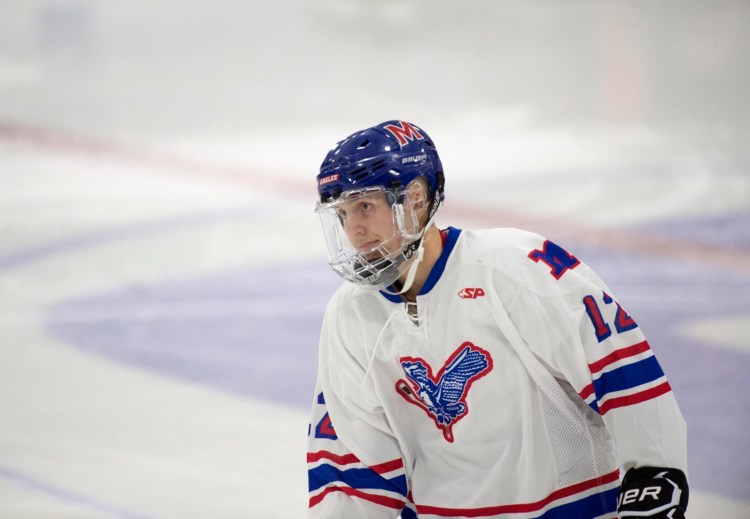WATERVILLE — When last the hockey world saw Dylan Cunningham skating in a Messalonskee sweater, he was an undersized freshman possessing very clear offensive skills while lacking some of the attributes needed to succeed within the finer margins of the game.
What a difference two years made.
After skipping out on his sophomore and junior seasons with the Eagles, Cunningham made a triumphant return to Messalonskee’s varsity squad on opening night last weekend. He scored three goals, including a tide-turning one in the final seconds of the opening period, sparking a pair of four-goal comebacks in a win over the Waterville/Winslow co-op. Almost immediately, it became clear the Eagles had missed Cunningham while he was playing exclusively for the Maine Moose junior program out of Hallowell.
“He’s faster. He’s making better decisions with the puck,” said Messalonskee coach Kevin Castner, whose first season at the helm came during Cunningham’s freshman year in 2016-17. “He’s not as timid as he used to be, and he’s stronger on pucks. It’s all the strengths that come along with maturing. He’s stronger, smarter, more experienced. He’s turned himself into a fantastic hockey player.”
Cunningham, who had three goals and an assist through the first two games of the season, boasts great bloodlines.
His two older brothers, Chase and Jared Cunningham, were each part of Class B state championship Messalonskee teams in 2014 and 2015 and a program that won four consecutive regional titles from 2012-2015. Each served a time as captain under former coaches Mike Latendresse and Joe Hague, and both were prolific scorers. Jared Cunningham holds the Messalonskee career scoring record with more than 270 points, in 2015 having surpassed Chase Cunningham’s previous mark of 256, set in 2014.
Dylan Cunningham’s numbers won’t match those gaudy totals, but there are other ways in which he is very much like his two older brothers.
Castner is typically loathe to single out individual players, valuing contributions to the team — and its overall success — over any single set of statistics. But even the oft-understated bench boss gushes about the effect of Cunningham’s mere presence on the culture of the program.
“He makes the kids around him work harder,” said Castner, who was an assistant coach for Messsalonskee’s state championship team in 2015 and regional finalist squad in 2016. “He raises their level of play, too. If there’s one thing I can say about the Cunningham family — and I didn’t have the privilege of coaching Chase — it’s that they are leaders. They can change the momentum of a team in the locker room very quickly. Dylan is the same way.
“Does he inspire us to be better? Absolutely. He pushes the other kids. Kids want to be like him.”
For his part, Dylan Cunningham is simply happy to be back playing high school hockey.
“The (Maine Moose) didn’t die, but we didn’t have enough kids for a full-season team for this winter,” Cunningham said. “Instead of being lazy, I came back to play for my school in front of my friends, in front of my family, and it’s been fun so far.”
Fun, yes, and with a win on opening night for a team that won just four games total over the last three seasons, a certain measure of successful, too.
That surprised Cunningham.
“It’s kind of jaw-dropping,” he said. “I knew we had it in us, because we get up early every day and we work hard. That’s going to pay off, I promise you that.”
Cunningham’s work on the wing alongside three-year varsity center Myles Hammond and senior Ben Hellen gives the Eagles as dangerous a top line as any team in Class B North. From there, there is a trickle-down effect, with younger players dropping into more comfortable supporting roles instead of having to carry the team while both growing and learning the varsity game as freshmen and sophomores.
That had been the case for the last few years at Messalonskee.
Had Cunningham and other junior hockey defections stayed with the school’s team, the Eagles might have fielded a more competitive team in some lean years — including the 2017-18 season, when they finished with just eight active players on the roster. Castner, though, doesn’t believe in what-ifs.
“I feel very fortunate he came back this year, don’t get me wrong,” Castner said. “When I would see him before, I would always ask him how hockey was going for him, how school was going, things like that. But I don’t have any ill will or anything like that for him going to play somewhere else. Why would I?
“Look at the player it helped him become.”
Comments are not available on this story.
Send questions/comments to the editors.



